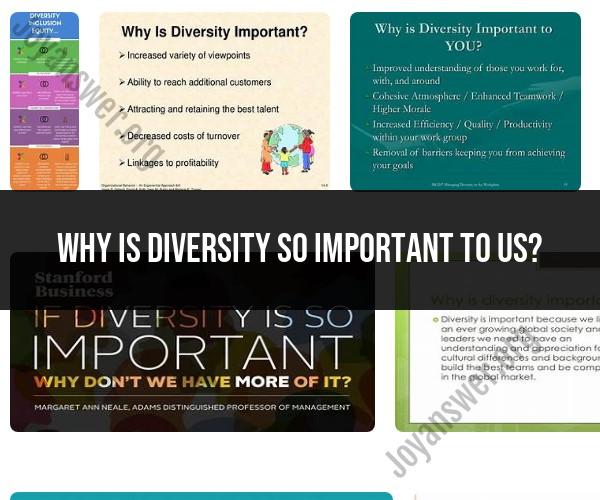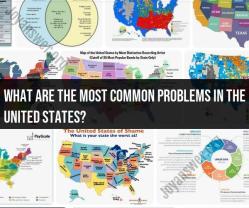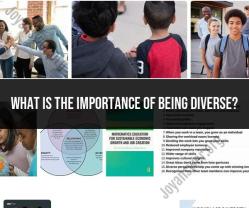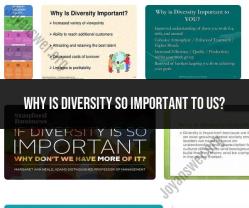Why is diversity so important to US?
Diversity is of great significance to the United States for several reasons, reflecting both its historical and contemporary contexts. Here are some key reasons why diversity is important to the U.S.:
Historical Foundations: The United States is a nation built on immigration and diversity. Throughout its history, people from various parts of the world have come to the U.S. seeking opportunity, freedom, and a better life. This diversity is woven into the nation's identity and is a source of pride for many Americans.
Cultural Enrichment: Diversity enriches American culture by bringing together a wide range of traditions, languages, cuisines, music, art, and perspectives. This cultural mosaic adds depth and vibrancy to American society, fostering creativity and innovation.
Economic Contributions: A diverse population contributes significantly to the U.S. economy. Immigrants and their descendants have played vital roles in entrepreneurship, labor force growth, and economic innovation. A diverse workforce can bring together diverse skill sets and perspectives, which can drive innovation and economic growth.
Social Cohesion: A diverse society allows people to interact with individuals from various backgrounds and cultures. This exposure fosters a sense of empathy, tolerance, and understanding among citizens, contributing to social cohesion and reducing prejudice and discrimination.
Global Competitiveness: In an increasingly interconnected world, diversity is an asset for international relations and diplomacy. The U.S. benefits from having citizens who can bridge cultural and linguistic gaps, facilitating trade, cooperation, and global influence.
Educational Opportunities: Diversity in schools and universities exposes students to a wide range of perspectives and experiences, preparing them to thrive in a globalized world. Diverse educational environments can lead to more enriching learning experiences.
Innovation and Problem Solving: Diverse teams are often more innovative and effective at problem-solving because they bring together different viewpoints and approaches. This diversity of thought can lead to more creative solutions to complex challenges.
Democratic Values: Diversity aligns with core democratic values such as freedom of speech, religious freedom, and equal protection under the law. It underscores the idea that all individuals, regardless of their backgrounds, have rights and opportunities.
Demographic Trends: The U.S. is experiencing ongoing demographic shifts, with a growing proportion of its population made up of racial and ethnic minorities. Recognizing and embracing this diversity is essential for the nation's future vitality and success.
Social Justice and Equity: Diversity is closely linked to the pursuit of social justice and equity. It highlights the need to address disparities and inequalities that may exist based on factors such as race, ethnicity, gender, and socioeconomic background.
In summary, diversity is fundamental to the American experience and plays a vital role in shaping the nation's culture, economy, and social fabric. Embracing and valuing diversity is not only a matter of principle but also a practical necessity for the United States to thrive and remain competitive in the global arena. It reflects the nation's commitment to pluralism, equality, and the pursuit of a more inclusive and equitable society.
Diversity's Vital Role in Shaping the United States
Diversity is a core value of the United States, and it has played a vital role in shaping the country into what it is today. From the earliest days of the nation, people from all over the world have come to America seeking a better life and the opportunity to pursue their dreams. This diversity has enriched the country in countless ways, from its culture and cuisine to its economy and innovation.
Diversity drives innovation. When people from different backgrounds come together, they bring with them different perspectives and ideas. This can lead to new and innovative ways of thinking about problems and developing solutions. For example, the United States is a global leader in technology, and this is due in part to the diversity of its workforce.
Diversity strengthens the economy. A diverse workforce is more productive and efficient than a homogenous one. This is because diversity brings together people with different skills and talents. A diverse workforce is also more resilient to economic downturns.
Diversity enhances our democracy. A diverse democracy is a stronger democracy. This is because diversity of thought and experience leads to better decision-making. A diverse democracy is also more likely to be inclusive and representative of all its citizens.
Understanding Why Diversity Is Central to American Identity
Diversity is central to American identity because it is rooted in the country's founding principles. The Declaration of Independence states that all men are created equal and endowed with certain unalienable rights, including the right to life, liberty, and the pursuit of happiness. The Constitution of the United States guarantees these rights to all people, regardless of their race, religion, or national origin.
The United States is a nation of immigrants, and its diversity is a reflection of its history. People from all over the world have come to America seeking a better life, and they have brought their cultures and traditions with them. This diversity has made America a more vibrant and dynamic country.
The Historical and Contemporary Importance of Diversity in the US
Diversity has always been important in the United States, but it has taken on new importance in recent years. The United States is becoming increasingly diverse, and this diversity is a source of strength for the country.
In the 21st century, the United States is more diverse than ever before. According to the U.S. Census Bureau, non-Hispanic whites will be a minority in the United States by 2045. This demographic shift is having a major impact on the country, both culturally and economically.
Diversity is also important for the contemporary United States because it is essential for global competitiveness. The United States is a global leader in many industries, but it faces increasing competition from other countries. In order to maintain its global leadership, the United States needs to embrace diversity and harness the talents of all its citizens.
Here are some specific examples of the historical and contemporary importance of diversity in the US:
- The Civil Rights Movement of the 1950s and 1960s was a fight for diversity and inclusion. The movement led to the passage of landmark legislation, such as the Civil Rights Act of 1964 and the Voting Rights Act of 1965, which helped to ensure that all Americans, regardless of race, have equal rights and opportunities.
- The Immigration and Nationality Act of 1965 abolished the national origins quota system, which had discriminated against immigrants from non-European countries. This led to a wave of immigration from Asia, Latin America, and Africa, which has made the United States more diverse than ever before.
- Diversity has played a vital role in the success of the US economy. Immigrants have started businesses, created jobs, and contributed to the country's tax base. Diversity has also helped to make the US economy more competitive in the global marketplace.
- Diversity is a source of strength for the US military. The US military is one of the most diverse in the world, and this diversity has helped to make it more effective.
Diversity is essential for the continued success of the United States. The country must embrace its diversity and harness the talents of all its citizens in order to maintain its global leadership and prosperity.







